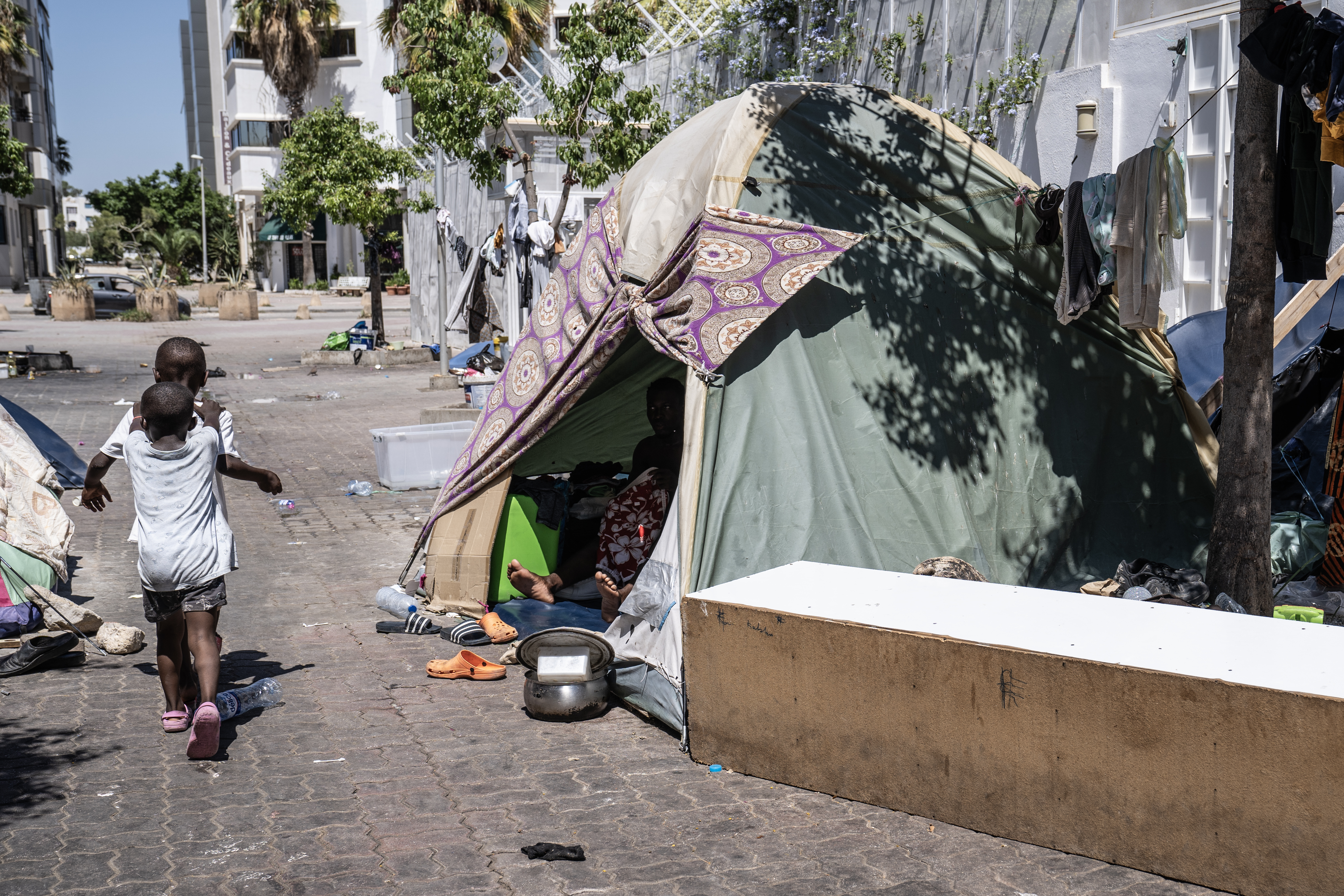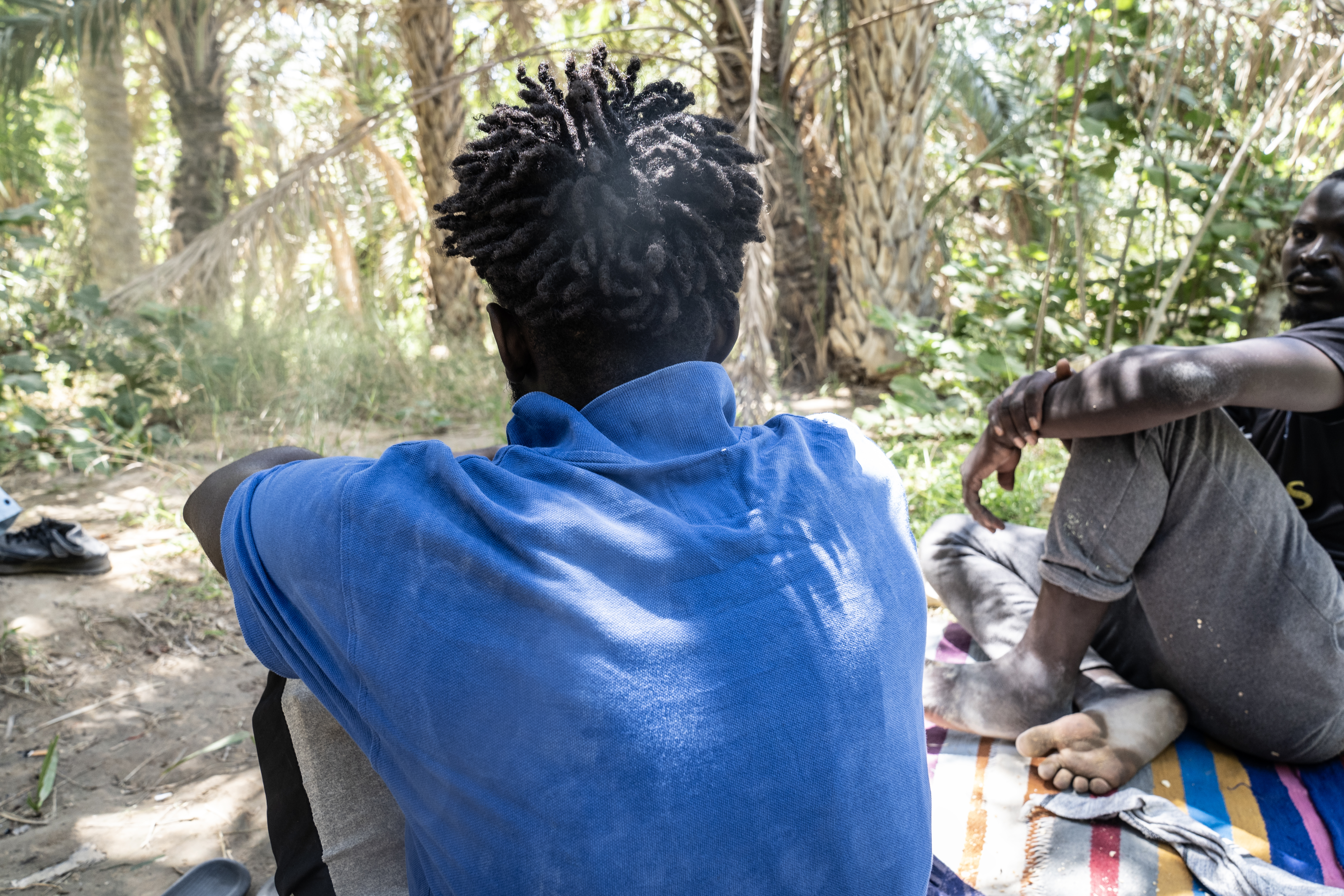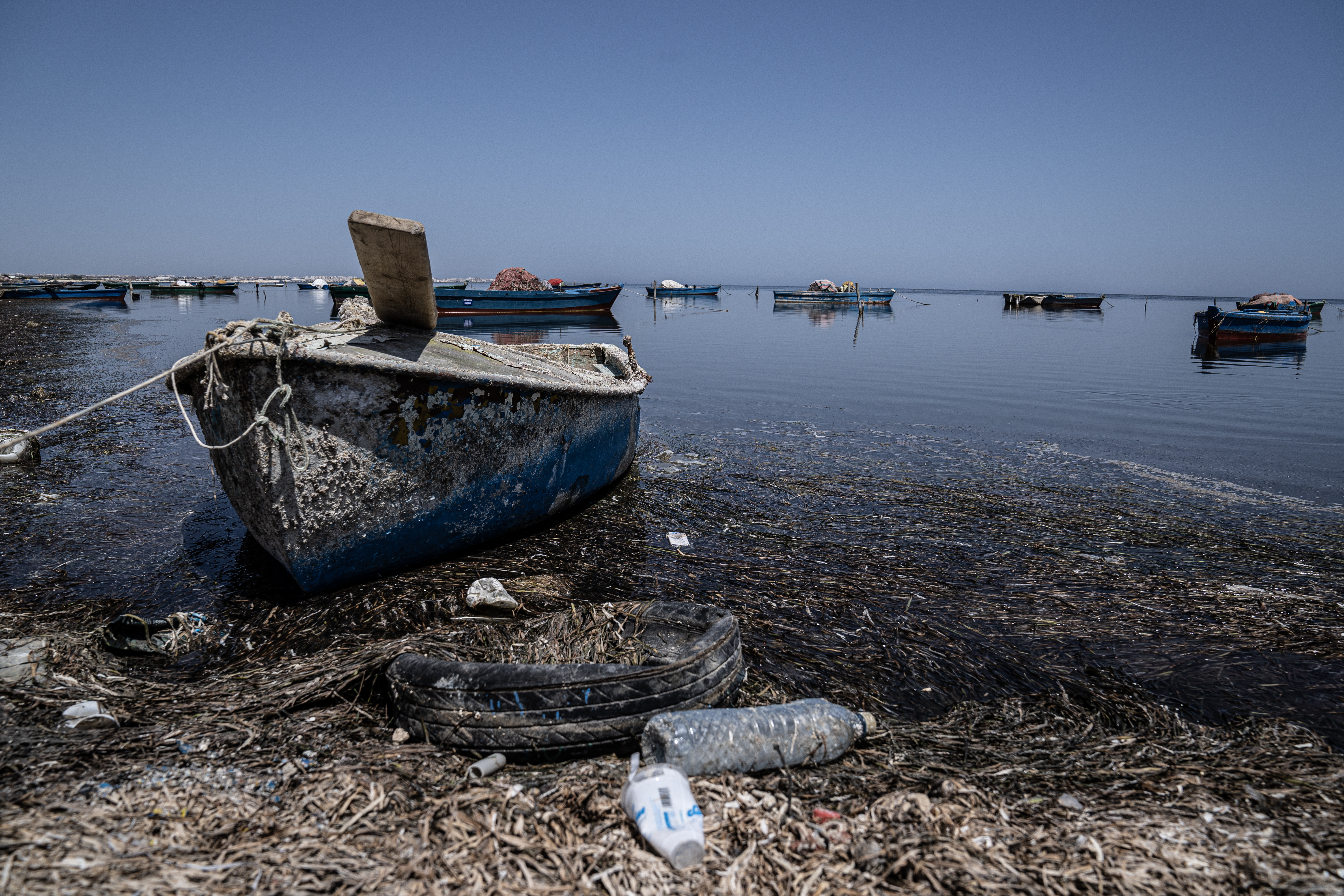Along the sidewalk of the main avenue, a short distance from Tunis International Airport, three boys seek shelter from the sun by sitting on the ground, their backs against the wall. One of them stands up and walks a few dozen meters to a tent encampment that has sprung up amongst the buildings of this posh neighborhood of embassies and international cafes. “We have been here now for six months without any prospects,” says Ibrahim, who left Burkina Faso and has been on the road for almost two years, “surviving on handouts and waiting for aid from charities that come to bring food, although it is never enough. Among us here there are people from different backgrounds, but we all had the same goal, to reach Europe. There are those who still believe, and those who have lost hope.”
In this shantytown are young Burkinabe, Nigerians, Somalis, Ethiopians, Sudanese. Mostly men but increasingly also women, often with young children, who arrived in Tunisia with the idea of embarking and reaching Italian shores after grueling journeys and long periods of detention behind them, spent in migrant centers in Libya. Many of them have already attempted the crossing to the Italian island of Lampedusa, but have been stopped and sent back by the National Guard, or have been left at the mercy of the waves with their engine failing before being brought back to shore by some passing fishing boat.
“I have already tried to get on a boat three times,” Ibrahim says, “but it is very difficult to get to your destination if you have a boat in bad condition and the sea is rough. The last time I thought I had made it, we had already pushed on into international waters, but instead we were robbed of our engine and cell phones. We thought it was over until we were spotted by a group of fishermen who rescued us. I was glad to be alive, but it was a blow to find ourselves once again without money, and starting over on this side of the Mediterranean.”
Sea marauders are one of the dangers migrants often run into, and they can determine the success or failure of the crossing, paid in advance to those organizing the departures. Increasingly, boats are being built with makeshift means, and to economize, iron boats welded and built in people’s garages are made on demand, which once they set out fully loaded with human beings often take on water fast.
“I would not have left my country, had I not been forced to” says Ali, from Sudan, “but the war has disrupted our lives once again. How can a boy think that his future will be to take up arms and go fight, with no alternative?” Ali arrived here a few days ago after three months in Libya’s Beni Walid, one of the detention centers most infamous for its inhumane treatment of migrants.
“Now in Libya if you are Black you risk being stopped on the street and locked up in jail. No matter what you have done, if you have dark skin you have to suffer their blackmail. They call your family, threaten to kill you, and ask to have money sent to them to spare your life. I was tortured and I still have the marks of the beatings on me, and also the pains. Many of us have fractured bones that have healed themselves, no one has ever seen a doctor, either in Libya or here in Tunisia.”
Waiting times in the country are lengthening based on the number of failed attempts to make the crossing. Meanwhile, not even minors have been placed on a real path towards immigration, where those under-18 who are unaccompanied are generally properly followed throughout their asylum applications.
“The routes have changed over the past two years,” explains Khalifa Chibani, a former colonel who until 2018 was spokesman for the Ministry of the Interior and before that for the National Guard, “and one of the key factors for the increase in migrants from sub-Saharan countries is Libya’s instability, which is unable to receive, but also unable to control, migratory flows. Another increasingly traveled and relatively new route is the Algerian border, which is less controlled than the Libyan border.”
Leaving Algeria behind and continuing on to the Nefta desert in the Tozeur district, the migrants find refreshment in the oases surrounding the city, and there they wait each day for the sun to set, and then set out again, on foot, for the coast, crossing the country from west to east, passing through Gafsa on their way to Sfax.
The palm groves provide shade, dates, and thanks to the work of a network of civil society volunteers, even food and drink. The area, however, is not safe, and at night migrants risk assault and robbery. “The other night they took away my cell phone, and with it the phone numbers of my family members,” says Ahmed, who has been in Tunisia for a week, “now I have lost any contact with them, I cannot tell them that I am alive, and where I am. Other than the clothes I’m wearing, I have nothing left.”
Also arriving from Algeria after weeks of waiting at the border was Nadir’s wife, one of the few who decided to settle in Tunisia after a failed sea departure and the loss of 3,000 euros set aside a few dinars at a time through months of work. Today Nadir, an Ivorian, lives in Zarzis, a southern town about 80 km from the Libyan-Tunisian border at Ra’s Ajdir, and here he has found work as a bricklayer. He spent 1,300 dinars, nearly 400 euros, on a coyote to facilitate his partner’s journey from Ivory Coast.
“I have been all over the country over the last few years,” he says, “and I have enountered a lot of racism, despite the fact that conditions are better than in Libya. Here you don’t run the risk of going to jail and being tortured, but being Black attracts prejudice and discrimination. If you get a job most likely you will not be paid, if you go into a store or look for a house to rent the prices for you are higher. I was lucky because I found an honest person who trusted me and hired me as a carpenter. But in order not to have problems I try to go out as little as possible, and after work I go home, I don’t hang out with anyone, I don’t go out in the evening, and I don’t drink alcohol. I have given up Europe now, I can tell it was not in my destiny.”
Nadir is an exception among sub-Saharan migrants because those who want to stay in Tunisia are a distinct minority. For almost all of them it is a transit country, the last land border before the sea. A stop like any other. Usmah, a Sudanese who now lives in Medenine, 60 kilometers from Zarzis, has been in Tunisia for a long time, but he has not resigned himself to staying. “Here the economic crisis is very pronounced, and the currency is devalued,” he explains, pulling out a crumpled fifty euro bill, “with a salary in dinars I can barely support myself, let alone help my family in Sudan, with eight younger siblings. These are the euros I need, there is no alternative. I keep them in my pocket to remind me, and I will try to go to Europe a hundred times if I have to, sooner or later I will get there. Dying here of hardship or dying at sea doesn’t make a big difference.”
The guilt of being stranded in a transit country, in precarious conditions, often months or even years after departure, is a common feeling for many young people have promised to care for those left behind, and instead fail to help. Setting aside money for the next stage is sometimes an exhausting process, and those who cannot find regular employment are more vulnerable to the demands of criminal networks, and not infrequently become involved in drug dealing, prostitution or international organ trafficking.
Although Tunisia has become the leading country in terms of number of departures by sea, surpassing Libya at the end of last year, it is difficult to quantify the presence of migrants in the territory, because their movements are continuous and the conditions of the people very different from each other, depending on the period of stay. There are those who have just crossed the borders, those who have reached the coastal cities of departure and are waiting for the call to embark, and those who have already failed the sea route and have to start over again. Each stage of the journey corresponds to a different vulnerability.
The nuances in migrants’ stories and internal flows within Tunisia became particularly evident starting last July, after clashes in Sfax between some local gangs and migrant groups following the death of a man involved in a fight. Anti-foreigner demonstrations were followed by removals, more or less voluntary, and in some cases forced deportations to border areas. All of this has revealed not only the profoundly uncomfortable situations among migrants and the country’s severe limitations in managing immigration from a humanitarian point of view, but also the difficulties in Tunisian society, particularly among young people from the less affluent classes who, like those from sub-Saharan countries, dream of a future in Europe.
Cover photo: oasis in the Nefta desert. All pictures have been taken by Ilaria Romano, all rights are reserved.





